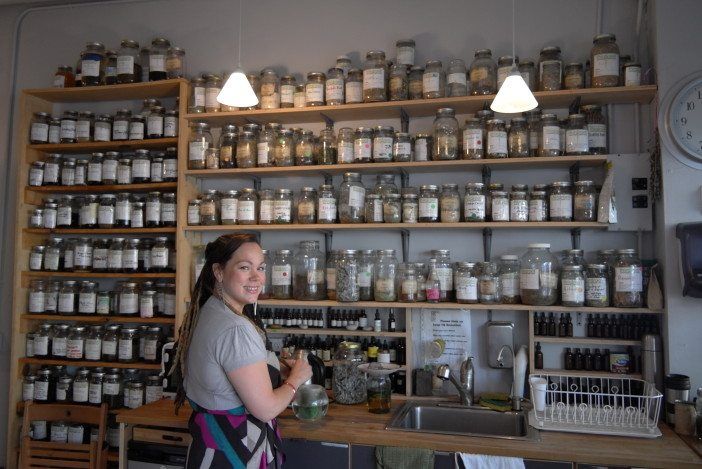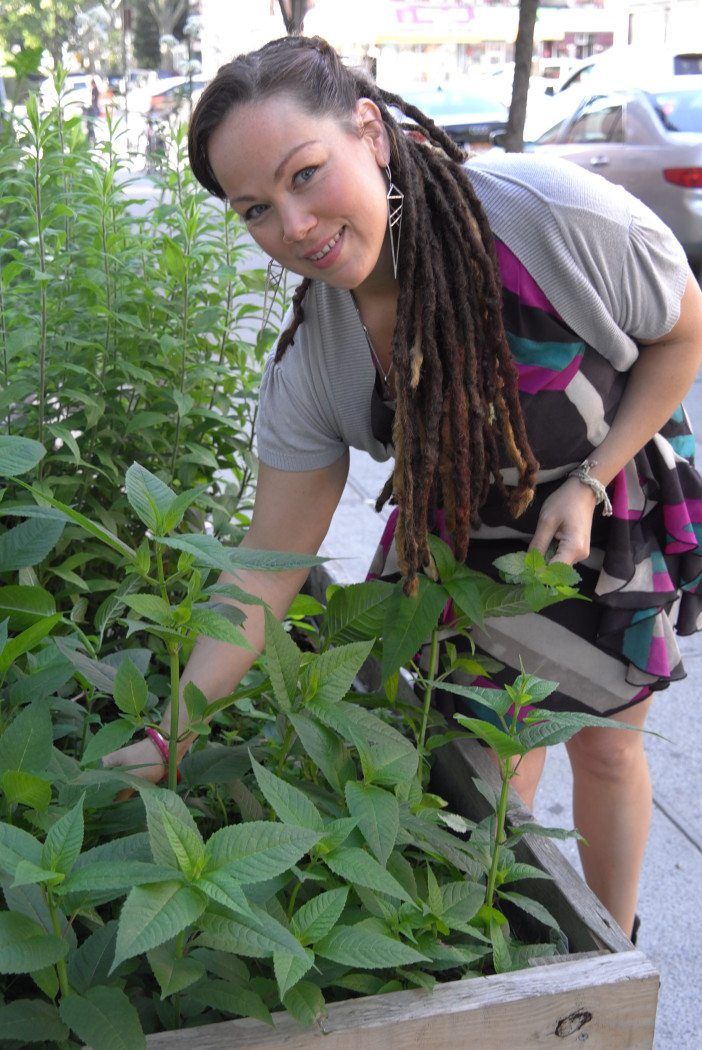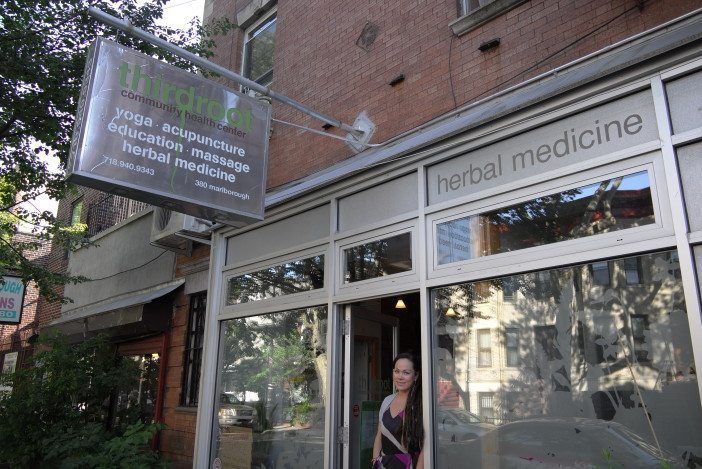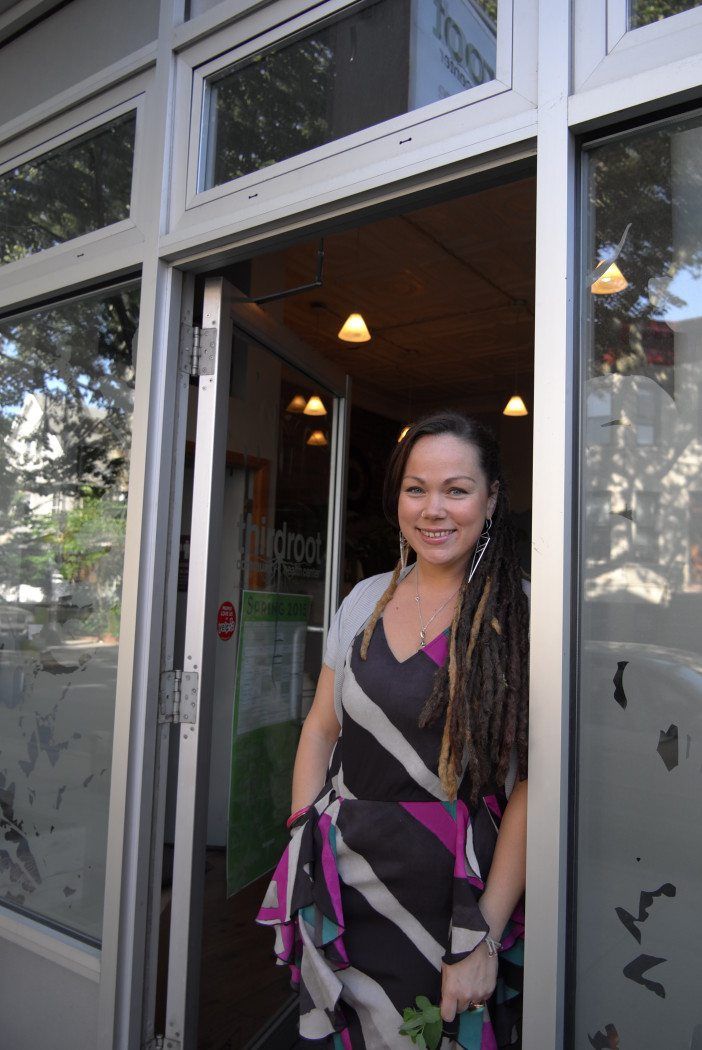The Ditmas Park Word: Angela Ueckerman On The Third Root Community Health Center, Why She Loves Raising Her Son Here & More

From new transplants hailing from places across the city, country and globe to residents who have lived in our area for decades, our neighborhood is home to an amazingly diverse collection of people. This interview is part of our “The Ditmas Park Word” series, in which we’ll get to know some of our wonderful neighbors who make our community what it is today. For our latest addition, we interviewed Angela Ueckerman, a founding collective member at Third Root Community Health Center (380 Marlborough Road, by Cortelyou Road).
How long have you lived in the neighborhood? I have lived here for almost 10 years with my eight-year-old son, Hakkai.
Where did you live prior to here? I grew up on Long Island, in Oceanside. Prior to living here, I lived in different neighborhoods in Brooklyn and for a time in Boulder, Colorado, where I studied herbal medicine.
What prompted the move to this neighborhood? I moved here when I was pregnant, looking for a good place to raise my son. My son is of mixed race so we were looking for a diverse community.
What kinds of changes have you seen in the neighborhood over the past 10 years? I have seen many changes — new businesses come, some sadly go, great restaurants, and the expansion of the Flatbush Food Co-op. However, the recent violence in our neighborhood has been disheartening. It is a new feeling for me, feeling the fear and wanting to do something to help the community. I feel my role in this community is to hold space for the struggles and the blessings of my neighbors. Our emotional well-being affects our physical health, so if there is tension in the community, there is tension within ourselves and vice versa. I don’t expect to fix it, but if I can support one person who is dealing with it, I make the situation better. I do that with joy and I receive a lot of joy in return.

What do you like about the neighborhood? I like the cultural and economic diversity and that there is a sense of real community. I feel support from the community and from other families and businesses that is authentic. I feel like there is a sense of collaboration. When my son was young, we participated in cooperative schooling with other families. And now I’m in a business that is a worker-owned cooperative, so I always feel supported.
What is missing in our neighborhood? A friend of mine opened Kettle & Thread on Church Avenue, and I’m excited about it! I feel we needed a creative space in the neighborhood where people can spend time surrounded by music and art. And a space where the kids can go to learn different crafts. I’m looking forward to collaboration there as I am currently working on a small line of custom herbal teas for the shop. Much more to come about that!
Finish this sentence: West Midwood is… a gem.
We live in a very diverse neighborhood, how meaningful is that to you? I intentionally chose this neighborhood and live on a quiet tree-lined block where people speak all different languages and come from all over the world. I think living here is a great experience for my son.
Do you feel supported as a single mother? I feel very supported by friends and other parents; we genuinely look out for one another. If I’m ever running late to pick up my son from the school bus there will always be someone to look out for him, and me for them.
What is your profession? I’m an acupuncturist, a clinical herbalist, and I teach herbal medicine. I’m a founding collective member of Third Root, a worker owned cooperative with a social justice emphasis providing holistic healthcare for all. I also see private clients both in my home and provide house calls for those that need or prefer it.

Tell me about the founding of Third Root. In 2007, Jacoby Ballard and Green Wayland-Llewelin had this vision to provide a place that would provide healthcare, yoga, acupuncture, massage and herbal medicine to the community on a sliding pay scale. They had found this space that no one had occupied for years so the storefront was falling down. They found like-minded people to get on board and raise money to start a business together. The working of the business was something that we figured out along the way. We had to write a business manual for ourselves and now we are approached by other similar business around the United States for advice on starting up worker owned co-ops in our field, so we share that manual and occasionally provide consults for them.
Can you provide more details about your acupuncture/herbal medicine practice? Since I do practice acupuncture and herbal medicine, I offer both to my clients and we choose whichever suits them or a little of both. Acupuncture and herbal medicine are both traditional models of healing that are designed to be preventative care. Five different people can come to you with chronic headaches, but we can treat them all very differently. Holistic medicine is about treating an individual-who they are and how they are constitutionally, not just addressing a symptom but also the underlying cause. I trained in both Western and Chinese herbal medicine so I do herbal consults and make custom formulations for my clients. I not only will use plants, but also aromatherapy and Tui Na bodywork, and I’m trained in Reiki. We are also trained in nutrition so in a session there is a lot of talk about lifestyle and diet. I also do spiritual and emotional work with people. I listen and support people with what they are going through and try to provide as much support and guidance as I feel that I am able.
How does acupuncture work? It is an ancient traditional medicine that has been around for thousands of years. Our organs have energy pathways and functions that travel in specific pathways called meridians. And along those meridians there are specific points in very specific locations. We talk to the person, look at what they are presenting in their body and use pulse and tongue diagnostic methods to develop a point protocol to support the healing intention. We locally insert sterile hair-fine needles into these points and may stimulate the needles with various methods. The person sits with the needle for about 22-35 minutes (depending on the person and condition). We may also use another technique called moxibustion which is burning a plant called Mugwort (which grows all over locally and abroad) to warm over the needle/point to stimulate movement, relieve pain and nourish.
I have used this technique to turn babies who are in the breech position, and to lessen menstrual flow. We also can use cupping, a suction technique to relieve muscle pain, release colds and support in asthma. I will always end a session with a touch, or a little massage to bring the person back into their body and to help ground them. For people who are afraid of needles we can do acupressure, herbs, local aromatherapy, etc.

What lead you to pursue this type of work? I did my undergraduate work in fashion design, and I took an elective course in Tai Chi. The teacher of the class shared books with me about holistic health, spirituality and herbal medicine. And I recall that when I was a kid my dad gave me St. John’s wort during puberty, and I found that it helped me with my transition into young womanhood.
Where did you train? I did a 1,500-hour certification program in Western herbal medicine at the Rocky Mountain Center for Botanical Studies in Colorado. I received a Bachleor’s of Science and my master’s degree in Traditional Oriental medicine at Pacific College of Oriental Medicine in Manhattan that trained me in acupuncture, Chinese herbal medicine, Tui Na, cupping and moxibustion.
What services does Third Root provide? We provide yoga, massage, private acupuncture sessions, community acupuncture in a group seeting, herbal education, herbal consultations, meditation and ongoing workshops in related fields. We also rent our space to others to hold workshops.
How many people do you serve on a monthly basis at Third Root? We currently serve about 800 people monthly.
Do you feel that most residents in the neighborhood know what Third Root does? What would you like them to know? I feel that more often than not, people don’t know and are curious about who we are and what we do. We want to reach all of the diverse populations in our neighborhood and work diligently to reach out to our community. We encourage people to come in and learn about how we can support each other, because we want people to access these services. We have a very fair sliding pay scale rate, as well as donation-based classes and some of the lowest prices in Brooklyn and NYC. This is a way all income levels get the same quality care-some pay the top of the scale and that balances our neighbors that need the bottom of the scale.
What do you enjoy about your work? Being a person that lives and works in the neighborhood, I genuinely care for my local clients. I get to see them outside and see that they are progressing. I have helped people get pregnant, have helped to induce their labor, and then get to see their baby grow up! It is special to me and an honor to support the community in that way. It makes me feel very connected to the community in a genuine and authentic way.
If you know someone you’d love to see featured in this series, let us know! You can email us at editor@ditmaspark.com.



